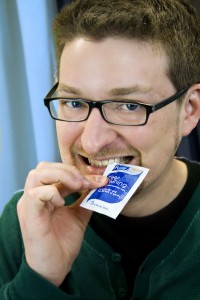I realized something was different when I was in grade school.
When I was six, the compulsions were small – like scratching my nose exactly five times or touching part of my bedpost before I went to sleep. But as I grew, so did they. Even though we were not a religious Jewish family, I would pray every night worried that my prayers wouldn’t count if they were interrupted. If I was interrupted, I thought I’d have to start over so I didn’t incur God’s wrath. Once, when I was 9, I peed myself during prayer. I was afraid to tell my dad about the accident and embarrassed by the thoughts I knew I couldn’t explain. When I finally told my dad all he said, “When you have to go, go!”
Part of the difficulty of being a child with OCD is that adults often chock up odd behavior to “kids being kids.” Adults misdiagnose or may not be truly aware.
In my teens, OCD started affecting my social life. Part of my OCD includes germaphobia and, as my high school years predated the use of hand sanitizer, I had a hard time. The bathrooms in my 4000-student-high-school were atrocious and I spent long periods of time wiping down toilet seats with little packets of tissues I brought for the occasion. When I finished, I often washed my hands until they bled. I hoped teachers would be ok with my time out of class and that other students wouldn’t assume I had severe stomach issues. Regularly getting upper respiratory infections (all that hand washing…) and having constant sore throats that kept me – an already shy kid – quiet didn’t help either. Avoiding getting sick became a painful challenge.
After high school I wanted to try to have the “true college experience” and live in a double dorm room. My roommate, however, did not make this easy. He began selling drugs from our room, including LSD, which I had had a fear of since the scary PSAs of the 80s and a teacher who comically worked “bad trip” warning stories into every subject. The idea of accidentally touching an acid-laced surface in our room and having a bad trip consumed me. When I woke to see him at the foot of my bed one morning, drunkenly peeing on my stuff, I decided I was out of there. It was all single units after that.
After a year of medicating myself to sleep with full doses of NyQuil, I realized I needed a change. Obsessive thoughts kept me up at night. I repeatedly worried that a person would break into my apartment with a baby, stick my dirty fingers in the baby’s mouth, and cause the baby to get sick and die. I checked my car more than 12 times one night, thinking it wasn’t parked exactly within the lines and a woman would have to park further away, walk through the dark, and then be attacked. I dropped out of classes and, when I was down to only one hour of a sleep a night, I decided to start cognitive therapy with an LCSW. That went well, at least for a while. I still felt weird telling her all my habits. I was reluctant to take medication because I felt uninformed about it and worried it would remove whatever introverted personality I had left to offer.
I may have put medical treatment off at first, but now I realize it’s necessary and no one should be ashamed. While I think that no amount of therapy and no amount of meds will cure me, I believe I have the right to see medical professionals that will work to find out what is the best course of treatment for me.
 Born and raised in Miami, FL, Evan is a stand-up comedian and has performed around NYC and outside NY. He is also the co-producer/host of the stand up show “Comic Sans,” at Over the Eight in Brooklyn. Evan also co-produces/hosts “Call Us Crazy” a podcast devoted to enlightening and entertaining with guests discussing their mental health issues. www.calluscrazypodcast.com
Born and raised in Miami, FL, Evan is a stand-up comedian and has performed around NYC and outside NY. He is also the co-producer/host of the stand up show “Comic Sans,” at Over the Eight in Brooklyn. Evan also co-produces/hosts “Call Us Crazy” a podcast devoted to enlightening and entertaining with guests discussing their mental health issues. www.calluscrazypodcast.com
He’s studied improv at the UCB, acting at TVI, and journalism at the University of Central Florida. Evan has clinically diagnosed Obsessive Compulsive Disorder, that, while challenging has also provided some excellent of comedy fodder.








Leave A Comment